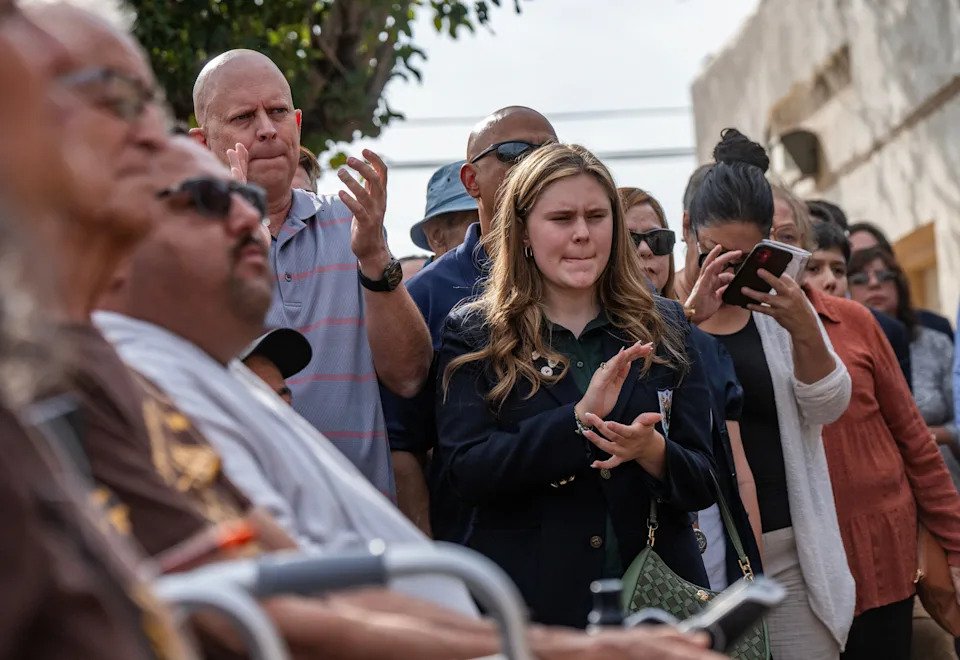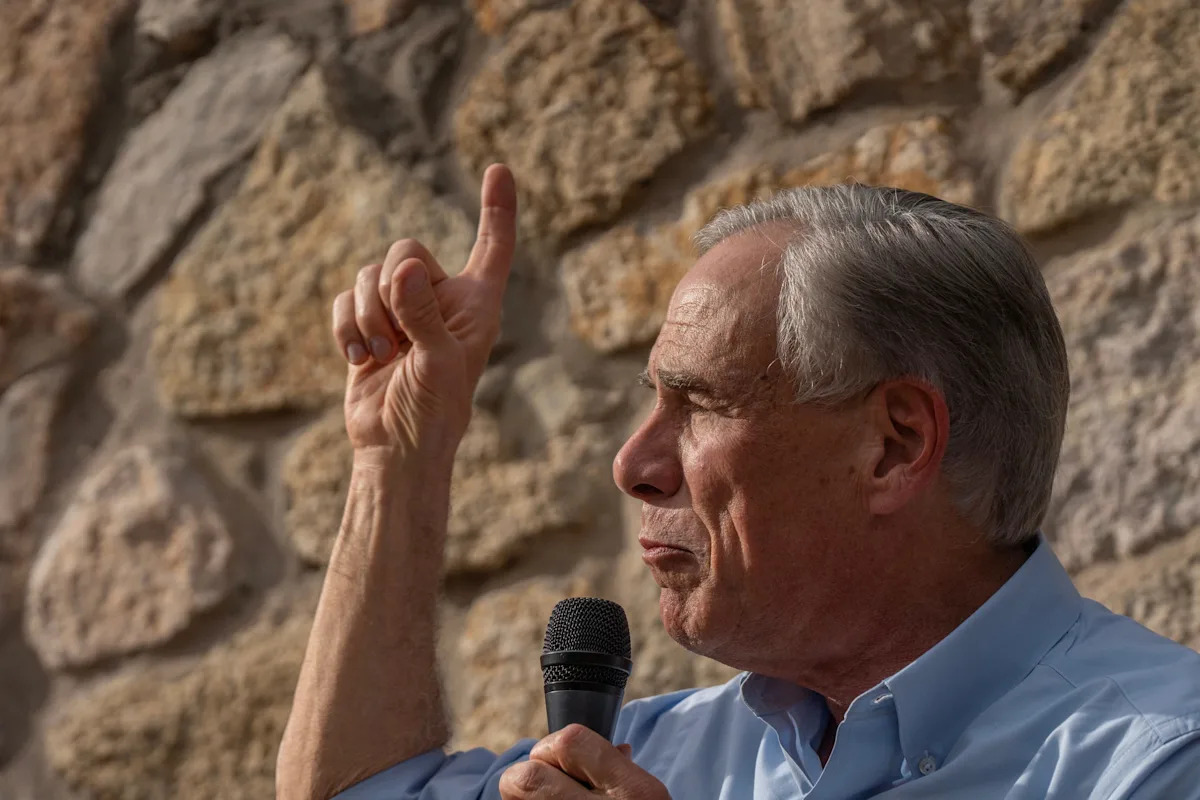A visit by Gov. Greg Abbott to El Paso quickly turned into a fiery voter rally to bolster turnout for a full slate of Texas amendments on the ballot this November.
Election Day is Tuesday, Nov. 4. Aside from statewide propositions, there are a few races in neighboring El Paso Borderland towns.
Abbott, surrounded by members of the El Paso County Republican Party, visited Riviera Cocina & Cantina Patio at 5218 Doniphan Drive on Thursday, Oct. 23, to spur voters to the polls on the 17 propositions on the ballot that range from small business tax breaks, water infrastructure, tax reform, and citizenship voting requirements.
Protesters greeted Abbott in El Paso, denouncing the governor’s role in Texas congressional redistricting that they say targets Hispanic and Black voters to give the GOP a chance to win more seats in Congress in 2026.
Abbott made a bold statement about voting trends on the border.
“We are loud and proud and (Republicans) will win El Paso County this election cycle,” Abbott said. “Something is going on when you see border counties across Texas turn red for the first time. The reason was because the Democrats had abandoned hope for a future along the border. That hope and opportunity is the Republican Party of Texas.”

Supporters applaud Texas Gov. Greg Abbott as he delivers remarks during a “Get Out the Vote” rally at Rivier Cocina & Cantina in El Paso, Texas, Thursday, Oct. 23, 2025. About 150 people attended the event, while a dozen protestors demonstrated across the street.
In what Abbott called “common sense” bills signed by his office, he took aim at what he characterized as a woke agenda being reversed by a recent and busy legislative session.
The GOP has been in control of Texas politics and its legislative agenda for decades.
Abbott cited a bevy of examples where Texas has joined other conservative states in similar legislation, like school choice, gender regulations in school sports and gender requirements for school bathrooms. A crescendo of applause was sparked when he mentioned a ballot amendment that would limit voting in the state to U.S. citizens only, while saying that other states are far less rigorous about election security.
Non-citizens are already barred from voting in Texas and federal elections.
More on early voting Where to cast early ballot in El Paso County for local races, 17 state propositions
“Yes, we want to empower Texas. Early voting began this Monday and goes on to next Friday and there are very important constitutional amendments where we’re counting on you to change the future of Texas,” Abbott said.
Election Day is slated for Tuesday, Nov. 4.
What are the propositions on the ballot in Texas?
Texans for Fiscal Responsibility, a state watchdog group, outlined the 17 propositions and their impact on state taxpayers. They include:
Proposition 1 creates a funding boost for Texas technical colleges. If passed, it create two new funds to support the Texas State Technical College System, which provides job training and career-focused education across the state.
Proposition 2 establishes a ban on capital gains taxes in the state. This amendment would constitutionally ban taxes on capital gains made from selling stocks or other investments.
Proposition 3 would force a mandatory bail denial for certain charges. If passed, it would require judges and magistrates to deny bail to people accused of certain violent or sexual felonies, which is allowed but not mandated in the current state constitution.
Proposition 4 would create water infrastructure funding across the state and would give up to $1 billion a year in sales tax revenue to the Texas Water Fund, starting in 2027 and running for 20 years.
Proposition 5 would create an animal feed tax exemption.
Proposition 6 would permanently bar the state from imposing occupation taxes on businesses like stock exchanges and broker-dealers, and on securities transactions.
Proposition 7 would establish a property tax break for veterans’ surviving spouses.
Proposition 8 would prohibit the legislature from imposing “death taxes” applicable to a decedent’s property or the transfer of an estate, inheritance, legacy, succession, or gift.
Proposition 9 creates a property tax exemption for landlords and business owners.
Proposition 10 establishes a temporary property tax exemption for homes destroyed by fire.
Proposition 11 makes a school tax exemption for homeowners who are disabled or over 65 years of age. If passed, the amendment would boost the amount of the state’s homestead exemption, or the portion of a home’s value that cannot be taxed to pay for public schools, for residents over 65 or those who have a disability to $60,000.
Proposition 12 would require the State Commission on Judicial Conduct to make discipline against state judges public. Abbott and the Texas Supreme Court would have the power to appoint commission members under this amendment.
Proposition 13 increases school tax exemption for homeowners.
Proposition 14 establishes the Dementia Prevention and Research Institute of Texas and allocates $3 billion for research into dementia, Alzheimer’s and Parkinson’s disease.
Proposition 15 would change the state constitution to affirm the rights and responsibilities of parents in choosing the type of school for their children.
Proposition 16 ensures that a voter must be a U.S. citizen and registered in Texas to cast a ballot. While audits of the recent election cycles have found almost no evidence of non-citizens voting in Texas elections, the amendment seeks to double down on security measures.
Proposition 17 creates property tax breaks for border security projects. The exemption would apply only to increases in a property’s value that come from installing or building border security infrastructure, like fencing or surveillance systems.
More on voting in Texas Voters will have final say on billions of tax cuts for Texas homeowners, businesses
Gov. Abbott visit met with protests
Abbott’s visit was not all smooth sailing as protesters met traffic along area streets, decrying the ongoing redistricting fight with the verdict in federal court yet to be made public. They also took aim at laws that they claim harm disabled voters and basic access and health care needs.
The nine-day trial of testimony from Texas legislators and political experts, laying out the process of redistricting, concluded on Friday, Oct. 10, with applause from the dozens of attorneys and the public who listened to more than eight hours of testimony every day in the courtroom.
In the proposed electoral map, the redistricting process grouped minority districts and resulted in them having less representation in the U.S. House.
The redistricting process began after the U.S. Department of Justice sent a letter to Texas Republican leaders asking them to find five new seats for President Trump.
Despite no discussion of redistricting during the 2025 regular Texas legislative session, Abbott called a special session to begin redistricting efforts after receiving the letter.
“These maps were drawn very consistently with federal law and the Supreme Court is looking at case right now that will expand upon the validity of lines drawn by the state of Texas. I feel very confident these maps are going to be upheld,” Abbott said.
More on Texans thoughts on redistricting Most Texans say partisan redistricting is a major problem, new survey finds
Kristian Jaime is the Top Story Reporter for the El Paso Times and is reachable at Kjaime@elpasotimes.com.
This article originally appeared on El Paso Times: Gov. Greg Abbott urges El Paso voters to back 17 Texas ballot items

